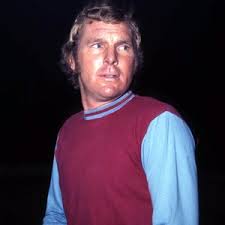
107. Duncan Edwards
Although his life ended tragically early, at the age of just 21 from injuries sustained in the Munich Air Crash, many experts agree that Duncan Edwards would have gone on to become one of the game's all time great players. Born in Dudley in 1936, he chose to join Manchester United as an amateur rather than local sides Wolverhampton Wanderers or Aston Villa, and with United aware of the interest from other clubs they made sure to tie him into a professional contract as soon as he was old enough to sign.
Edwards made his league debut aged just 16, in the spring of 1953, as a wing half. For a couple of years, he played regularly the first time whilst also still appearing for the youth team as they won the first three FA Youth Cups. In April 1955 he made his international debut for England in a 7-2 victory over Scotland. Later that year, he began his compulsory military service although he was allowed to continue playing for Manchester United during that time.
The 1955-56 season brought a first major honour, as United won the First Division title by a huge margin of 11 points from runners-up Blackpool. With manager Matt Busby defying the FA's opposition to the newly formed European Cup, Edwards was a part of the first English team to enter that competition, as they fell to eventual winners Real Madrid in the semi-finals in 1957. That year also brought a second consecutive league title, and only a narrow defeat by Aston Villa in the F.A. Cup final prevented United from completing the double.
Edwards was by now established in the national team, and was expected to be a key player in the 1958 World Cup having played an important role in the successful qualifying campaign. He was even being talked about as a possible future captain as the current holder of that role, Billy Wright, neared retirement. By early February 1958, Manchester United were trailing behind Wolves in the league but were progressing well in the European Cup again. A 3-3 draw against Red Star Belgrade took them through to another semi-final.
It was on the return journey from that match in Belgrade that tragedy struck. After refueling in Munich on 6 February, the team's plane failed to take off on the icy runway and crashed. Many of the passengers died instantly, but Edwards survived despite sustaining multiple injuries. For two weeks, he fought for his life in a Munich hospital but died from kidney failure on 21 February. Many have speculated on what he might have gone on to achieve in his career, especially as when England won the World Cup in 1966, Edwards would still have been just 29 and at the peak of his career.
Legendary Football Players - Duncan Edwards
Search My Football Facts & Stats
Web site designed & hosted by Paul Yarden © 2013 at Homestead™